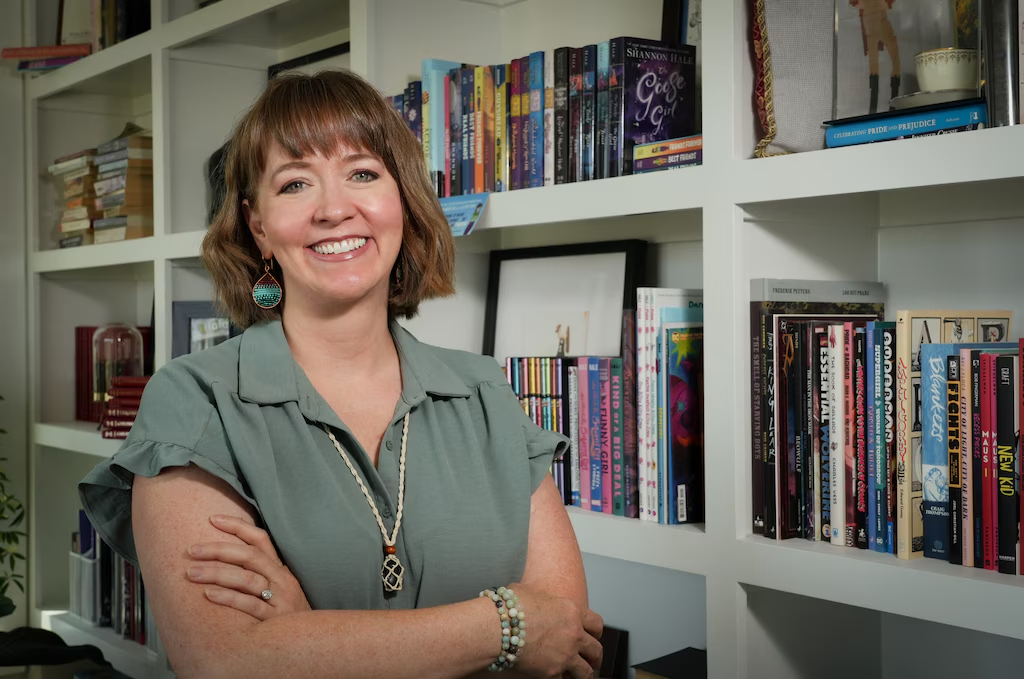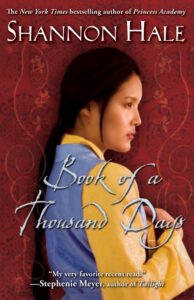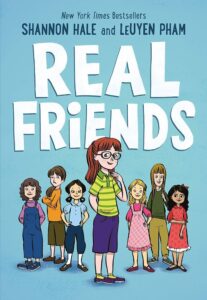
Shannon Hale, an award-winning and best-selling author of novels for adults, young adults, middle graders, picture books for younger children, and graphic novels, will be presented with the Smith-Pettit Foundation Award for Outstanding Contribution to Mormon Letters during the 2024 Association for Mormon Letters Virtual Conference, on Saturday, July 20, 7:00pm, which will be live-streamed on Youtube. Her award citation (available below) will be read, and after the ceremony, she will give a reading from one of her works.
Hale will also speak and be honored at a in-person event at The Compass Gallery, 274 West Center Street Provo, UT, Saturday, July 20, 2:30pm. Please RSVP on the link, and bring your family and friends to meet one of our great authors at this intimate event.
Finally, we held a conversation between Hale and two scholars of juvenile literature, Katie Irion (BYU) and Emma Tueller Stone (University of Cambridge). The trio talked about key moments in Shannon’s career, her approach to writing, depictions of gender in literature, and her relationship with Mormonism.
Award Citation
 In 2006, Shannon Hale’s middle grade novel, Princess Academy (2005), was awarded the Newberry Honor Medal, catapulting the book up the New York Times bestseller list and into the homes of children across the world. It’s the story of an adolescent girl – Miri – who attends an academy to learn to be a princess and, as Hale has described it, a “love letter to education.” At the eponymous Princess Academy, Miri learns to read, but she also learns what it means to belong in a community, as well as discovering the secrets about how her culture’s magic works. She comes to love stories enough that, even when she is the top student in the academy and is offered a life away from home to live beyond her wildest dreams, she turns it down. Reading and stories made her love her home, her family, and her people enough to stay, open an academy, empower the other girls around her, and invent her own path into her future with her people at her side.
In 2006, Shannon Hale’s middle grade novel, Princess Academy (2005), was awarded the Newberry Honor Medal, catapulting the book up the New York Times bestseller list and into the homes of children across the world. It’s the story of an adolescent girl – Miri – who attends an academy to learn to be a princess and, as Hale has described it, a “love letter to education.” At the eponymous Princess Academy, Miri learns to read, but she also learns what it means to belong in a community, as well as discovering the secrets about how her culture’s magic works. She comes to love stories enough that, even when she is the top student in the academy and is offered a life away from home to live beyond her wildest dreams, she turns it down. Reading and stories made her love her home, her family, and her people enough to stay, open an academy, empower the other girls around her, and invent her own path into her future with her people at her side.
 Princess Academy is only one of Hale’s books, but it’s a fitting metaphor for the core of many of her stories. From her first series, the Books of Bayern, which include The Goose Girl, Enna Burning, River Secrets and Forest Born, to her recent Princess in Black books and Real Friends graphic novels, Hale’s stories have often focused on young women who reject the scripts they are given and reinvent the world around them as a result. From retelling fairytales to insisting that a princess could also, obviously, be a secret assassin, Hale, as she explained in her blog, is “always” trying to “make them [her characters] feel like real people.”
Princess Academy is only one of Hale’s books, but it’s a fitting metaphor for the core of many of her stories. From her first series, the Books of Bayern, which include The Goose Girl, Enna Burning, River Secrets and Forest Born, to her recent Princess in Black books and Real Friends graphic novels, Hale’s stories have often focused on young women who reject the scripts they are given and reinvent the world around them as a result. From retelling fairytales to insisting that a princess could also, obviously, be a secret assassin, Hale, as she explained in her blog, is “always” trying to “make them [her characters] feel like real people.”
Starting her career with a series of fairytale retellings, Hale’s Books of Bayern series reimagines the Brothers Grimm’s story, “the Goose Girl” in a fantasy kingdom populated by dreamy princes, brave friends, and surprisingly helpful flocks of geese. The books in this series won several AML awards for young adult (YA) fiction, as well as a Josette Frank Award for fiction in 2004 and a place on the American Library Association top ten books for teens.
 Hale also published Book of a Thousand Days based on the Brothers Grimm story “Maid Maleen” and the Rapunzel’s Revenge middle grade graphic novel series.
Hale also published Book of a Thousand Days based on the Brothers Grimm story “Maid Maleen” and the Rapunzel’s Revenge middle grade graphic novel series.
 But not all of Hale’s books have been for young people or based on Grimm fairytales. Venturing into the world of adult fantasies, her first adult novel, Austenland, examines the ways stories can seep into her protagonist’s consciousness as she adventures into a world of Jane Austen-themed make belief that turns out to be real. Austenland was made into a film directed by Jerusha Hess and staring Keri Russell. It premiered at the 2013 Sundance Film Festival in Park City and has since become a beloved cult classic.
But not all of Hale’s books have been for young people or based on Grimm fairytales. Venturing into the world of adult fantasies, her first adult novel, Austenland, examines the ways stories can seep into her protagonist’s consciousness as she adventures into a world of Jane Austen-themed make belief that turns out to be real. Austenland was made into a film directed by Jerusha Hess and staring Keri Russell. It premiered at the 2013 Sundance Film Festival in Park City and has since become a beloved cult classic.
 In her Real Friends graphic novels (illustrated and cocreated with LeUyen Pham), Hale hilariously and heartwarmingly depicts her struggles with friendship and anxiety growing up. In this series, she is open about how experiences with religion influenced (and even added to) scrupulosity, making overt an ongoing issue in Latter-Day Saint communities. In a publishing industry that often shies away from depicting religion, Hale has been determined to keep images of her family going to church in the story, saying in an interview that “it would feel wrong not to” have that part of her life present in the story.
In her Real Friends graphic novels (illustrated and cocreated with LeUyen Pham), Hale hilariously and heartwarmingly depicts her struggles with friendship and anxiety growing up. In this series, she is open about how experiences with religion influenced (and even added to) scrupulosity, making overt an ongoing issue in Latter-Day Saint communities. In a publishing industry that often shies away from depicting religion, Hale has been determined to keep images of her family going to church in the story, saying in an interview that “it would feel wrong not to” have that part of her life present in the story.
 Cowritten with her husband, Dean Hale, and again illustrated by LeUyen Pham, Hale’s Princess in Black series for young readers follows Princess Magnolia as she lives both the life of a typical, traditional princess (frilly dresses and all) while simultaneously subverting stereotypes with her monster-fighting secret identity: the Princess in Black. Hale was inspired to write this story after her daughter, Magnolia, insisted that “princesses don’t wear black.” Like in many of her other stories, Hale set out to prove that even this rule has powerful, hilarious, and important exceptions.
Cowritten with her husband, Dean Hale, and again illustrated by LeUyen Pham, Hale’s Princess in Black series for young readers follows Princess Magnolia as she lives both the life of a typical, traditional princess (frilly dresses and all) while simultaneously subverting stereotypes with her monster-fighting secret identity: the Princess in Black. Hale was inspired to write this story after her daughter, Magnolia, insisted that “princesses don’t wear black.” Like in many of her other stories, Hale set out to prove that even this rule has powerful, hilarious, and important exceptions.
Recently, Hale has written about and focused on the often absurd and broken ways young people’s reading is gendered. In posts on her blog and articles and interviews in The Washington Post, Chicago Tribune, Bustle and The Salt Lake Tribune, she has talked about watching boys being told that her books – “girl books” – are not for them. Hale is fighting this bravely, rejecting the idea that books about girls can’t be for everyone; both for the girls who yearn to be main characters and the boys who would love her books, if only given a chance.
Hale has written across audiences, genres, ages and mediums, but there’s something about her work that always reminds me of what I first loved about Princess Academy: a promise that, no matter where one is, there’s a story there. And that stories always offer the possibility that there is something worth adventuring for and something beautiful, in every setting, to return to. In consistently creating glorious, real characters who fight for the communities and people they love while refusing to be placed in easy stereotypes or caricatures, Hale has created a body of work that seems to constantly affirm, just like Miri does, in Princess Academy, when she is gifted her own books that “reading those books had changed her, and she could not wait to let the whole village feel that difference” (2005, p. 308) (Citation by Emma Tueller Stone).

